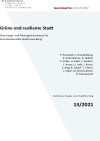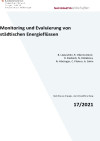Suchergebnisse
Grüne und resiliente Stadt - Steuerungs- und Planungsinstrumente für eine klimasensible Stadtentwicklung

Ziel des Projekts war ein „Proof of Concept“ eines Regelkreises und Tool-Sets zur Steuerung, Optimierung und Evaluierung einer grünen und klimasensiblen Stadt(teil)planung bestehend aus städtebaulichen und freiraumplanerischen Instrumenten sowie Klimasimulationen auf unterschiedlichen Maßstabsebene.
Schriftenreihe
13/2021
F. Reinwald, C. Brandenburg, P. Hinterkörner, B. Hollósi, C. Huber, A. Kainz, J. Kastner, F. Kraus, U. Liebl, J. Preiss, Z. Ring, B. Scharf, T. Tötzer, J. Züger, M. Žuvela-Aloise, D. Damyanovic
Herausgeber: BMK
Deutsch, 124 Seiten
Downloads zur Publikation
BIMaterial Process Design for Material Building Pass
Building Information Modelling supported compilation of a Material Building Pass; as a qualitative and quantitative documentation of the material composition of, and the material distribution within, a building structure. This project is a central milestone towards standardized, BIM-generated building material passes.
Monitoring und Evaluierung von städtischen Energieflüssen

Ausgangsbasis für das Projekt sind die Energiestatistiken. In einem ersten Schritt wird die Erhebungsmethodik im Detail analysiert. Basierend auf den Erkenntnissen der Analyse wird eine Methodik zur Erstellung städtischer Energieflüsse erstellt. Diese wird mithilfe des zu entwickelnden Planungsinstruments "Senflusk" an 5 Referenzstädten getestet.
Schriftenreihe
17/2021
B. Lepuschitz, R. Obernosterer, H. Daxbeck, N. Kisliakova, N. Hörzinger, C. Ploiner, A. Sahin Berichte aus Energie- und Umweltforschung 17/
Herausgeber: BMK
Deutsch, 65 Seiten
Downloads zur Publikation
PRoBateS - Potenziale im Raumordnungs- und Baurecht für energetisch nachhaltige Stadtstrukturen
Das Projekt hat das Ziel, Hemmnisse und Potenziale für energiepolitische Maßnahmen im Raumordnungs- und Baurecht zu analysieren und konkrete Handlungsempfehlungen für energetisch nachhaltige Stadtstrukturen zu erarbeiten. Das Projekt verknüpft dazu eine fundierte rechtswissenschaftliche Analyse mit einer raumstrukturellen und quantitativen Wirkungsabschätzung.
Eco.District.Heat - Potentials and restrictions of grid-bound heating systems of urban areas
Aim of the project Eco.District.Heat is to provide strategic decision-making support that enables Austrian towns and cities to deal with aspects of grid-bound heating (and cooling) systems in accordance with integrated spatial and energy planning from a holistic perspective when elaborating urban energy concepts.
Smart Services für ressourcenoptimierte urbane Energiesysteme von Stadtteilen
Das Konzept einer Smart City referenziert explizit auf eine nachhaltige Stadtentwicklung. Praxisrelevante und gewinnorientierte Geschäfts¬modelle (Smart Services), die gleichzeitig auch einen gesellschaftlichen und ökologischen Nutzen stiften, werden entwickelt. Die Smart Services wurden für den konkreten Anwendungsfall in drei österreichischen Stadtentwicklungsgebieten erarbeitet und in einem umfassenden Stakeholder-Prozess im Hinblick auf ihre Praxistauglichkeit überprüft.
URSOLAR - Optimierung der SOLARenergienutzung in URbanen Energiesystemen
URSOLAR stellt EntscheidungsträgerInnen eine Roadmap zur integrierten urbanen Solarenergie-nutzung zur Verfügung. Es wird aufgezeigt, wie Photovoltaik (PV) und Solarthermie angepasst an infrastrukturelle und rechtliche Gegebenheiten in idealtypischen Stadtquartieren aus ökonomischer, ökologischer und sozialer Sicht sowie unter Berücksichtig von Stakeholder-Interessen optimal ge-nutzt werden können.
Workshop: Roadmap zur integrierten urbanen Solarenergienutzung
3. Oktober 2016
FH Joanneum, Alte Poststraße 154, 8020 Graz
Bei diesem Stakeholderworkshop wird der Entwurf der Roadmap zur integrierten urbanen Solarenergienutzung vorgestellt. Außerdem erhalten Sie als ExpertInnen die Möglichkeit sich in die Gestaltung der Roadmap einzubringen.
BIMaterial Prozess-Design für einen BIM-basierten, materiellen Gebäudepass
Generierung des materiellen Gebäudepass (MGP) - Dokumentation der materiellen Zusammensetzung eines Bauwerkes, die quantitative und qualitative Auskunft über die relevanten Rohstoffe in einem Bauwerk gibt. Als Information und Datenbasis für das MGP wurde die Building Information Modelling Methode und ein digitales Gebäudemodell verwendet. Als Ergebnis wurde ein Pflichtenheft für eine BIM-basierte MGP App geschaffen werden.
URSOLAR - Optimization of SOLAR energy usage in URban energy systems
URSOLAR provides decision makers with a roadmap for the integrated use of solar energy in urban environments. The roadmap shows, how photovoltaics- and solar-thermal installations can be used in an ecological, economical and socially optimal way whilst considering legal requirements as well as infrastructural conditions in typical city quartiers and stakeholder interests.
Smart Services for resource optimized energy systems in urban districts
The concept of a smart city explicitly refers to a sustainable city development. To apply smart city concepts in practice, it is essential to develop practice- and profit-oriented business models (smart services), which at the same time generate social and ecological benefits. Smart services were developed for the application in three specific city development areas and their practicability was verified in a comprehensive stakeholder process with decision makers.
PRoBateS - Potentials of planning and building legislation for energetically sustainable city structures
The aims of this project are to analyse planning and building legislation in order to identify barriers, potentials and suitable courses of action for energy-orientated policy measures. Specific policy recommendations are developed with a view to increasing the sustainability of energy-related city structures. For these purposes the project combines two different disciplinary approaches: a thorough legal analysis and a spatial structure and quantitative impact assessment.
SynENERGY - Energy optimised settlement development by making use of synergies of energy efficiency, spatial planning and building culture
SynENERGY aims at an innovative, holistic approach to urban district optimization. The project targets a comprehensive analysis of the framework and urban development concept which includes not only optimisation of sustainable energy supply and use but also increased material flows (construction and disposal) at urban district level.
Syn[EN]ergy - Synergiepotenziale zwischen Stadtplanungszielen und Photovoltaiknutzung auf Freiflächen
Freiflächen wie Großparkplätze, Brachen oder manche Kategorien von Erholungsflächen bieten ein bislang wenig genutztes Potenzial für Photovoltaik-Anwendungen im urbanen Raum. Im Rahmen von Syn[En]ergy wurden Synergien und Konfliktpotenziale der PV gegenüber anderen Nutzungen untersucht, planerische Lösungsvorschläge für konkrete Freiflächen unter Berücksichtigung ökonomischer, stadtplanerischer, gestalterischer, rechtlicher und sozialer Aspekte entwickelt und die Ergebnisse gemeinsam mit Stakeholdern aus Wirtschaft, Verwaltung und Gesellschaft bewertet.
Syn[En]ergy: Development of Potential Synergy Effects between the Interdependency of Urban Planning goals and Photovoltaic Usage on Open Urban Landscapes
Open spaces such as parking lots, brownfields and some categories of recreation areas offer an underutilised potential for photovoltaics in urban regions. In the course of Syn[En]ergy an inter- and transdisciplinary approach potential synergies and conflicts with other use demands were investigated, a typology and practical solutions for selected areas with regard to requirements from economy, urban planning and design, legal as well social aspects developed, and then evaluated by stakeholders from enterprises, administration and the general public.
urban pv+geotherm - Innovative concepts for the supply of large volume buildings/ quarters with PV and geothermal energy
The use of renewable energies in inner city locations is mostly linked to higher costs andconsidered as problematic. The aim of this project was to optimize (cost and energy) heating (and where required, cooling) using geothermic and photovoltaic for an urban, densely-built development area. With the project´s findings it will be easier to ecologically and economically plan the use of renewable energies especially in urban areas.
KELVIN - Reduktion städtischer Wärmeinseln durch Verbesserung der Abstrahleigenschaften von Gebäuden und Quartieren
Potentialabschätzung einer möglichen Abschwächung des Auftretens städtischer Wärmeinseln durch die Veränderung der Oberflächenalbedo unterschiedlicher Stadtstrukturen (Boden, Dachflächen, Dachbegrünung etc.) bzw. damit verbundener Energieeinsparung durch Reduktion des Kühlungsbedarfs und Emissionsreduktion, um positive Auswirkungen auf Gesundheit und Lebensqualität (Human- und Wohnkomfort) in Städten zu ermöglichen.
Eco.District.Heat - Potenziale und Restriktionen leitungsgebundener Wärmeversorgung in Stadtquartieren
Ziel des Projektes Eco.District.Heat ist es, eine strategische Entscheidungshilfe für österreichische Städte zu entwickeln, mit der das Themengebiet leitungsgebundene Wärme- (und Kälte-) Versorgung in städtischen Energiekonzepten in Abstimmung mit energieraumplanerischen Fragestellungen aus ganzheitlicher Perspektive bearbeitet werden kann.
urban pv+geotherm - Innovative Konzepte zur Versorgung großvolumiger städtischer Gebäude/Quartiere mit PV und Geothermie
Im städtischen Bereich ist die Nutzung erneuerbarer Energien oft problematisch. Ziel war die Erarbeitung von Konzepten zur energie- und kostenoptimierten Beheizung (und ggf. Kühlung) mittels Geothermie und Photovoltaik für großvolumige Gebäude im städtischen Bereich. Mit den Projekterkenntnissen wird es in Zukunft leichter sein, im urbanen Bereich die Nutzung erneuerbarer Energieträger ökologisch und ökonomisch sinnvoll zu planen.
SynENERGIE - Energetisch optimierte Siedlungsentwicklung unter Synergienutzung von Energieeffizienz, Raumplanung & Baukultur
Ziel von SynENERGIE ist ein innovativer, holistischer Ansatz für urbane Siedlungsoptimierung. Fokus wird auf einen ganzheitlichen Analyserahmen sowie ein Entwicklungskonzept gelegt, das neben der Optimierung von Energieversorgung und -nutzung erhöhte Stoffströme (Errichtung und Entsorgung) auf Stadtteilebene mit einbezieht und zudem verstärkt auf die gezielte Synergienutzung von Energietechnologien in Abhängigkeit von Bau- und Siedlungstypologie achtet.
